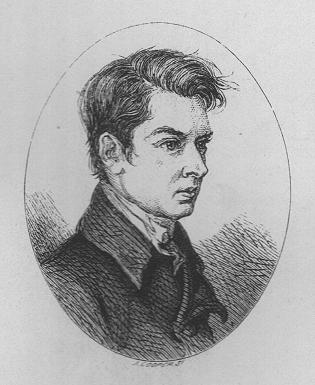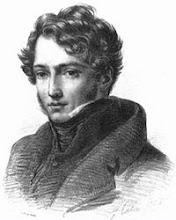'The love of liberty is the love of others; the love of power is the love of ourselves,' written by Hazlitt.
.jpg)
'Happy are they who live in the dream of their own existence, and see all things in the light of their own minds; who walk by faith and hope; to whom the guiding star of their youth still shines from afar, and into whom the spirit of the world has not entered! They have not been "hurt by the archers", nor has the iron entered their souls. The world has no hand on them,' by Hazlitt.
William Hazlitt, the son of an Irish Unitarian clergyman, was born in Maidstone, Kent, on 10th April, 1778. His father was a friend of Joseph Priestley and Richard Price. As a result of supporting the American Revolution, Rev. Hazlitt and his family were forced to leave Kent and live in Ireland.

'Prosperity is a great teacher; adversity is a greater,' Hazlitt.
The family returned to England in 1787 and settled at Wem in Shropshire. At the age of fifteen William was sent to be trained for the ministry at New Unitarian College at Hackney in London. The college had been founded by Joseph Priestley and had a reputation for producing freethinkers. In 1797 Hazlitt lost his desire to become a Unitarian minister and left the college.
While in London Hazlitt became friends with a group of writers with radical political ideas. The group included Percy Bysshe Shelley, Samuel Taylor Coleridge, Charles Lamb, William Wordsworth, Thomas Barnes, Henry Brougham, Leigh Hunt, Robert Southey and Lord Byron. At first Hazlitt attempted to become a portrait painter but after a lack of success he turned to writing.

'The only vice which cannot be forgiven is hypocrisy. The repentance of a hypocrite is itself hypocrisy,' Hazlitt.
Charles Lamb introduced Hazlitt to William Godwin and other important literary figures in London. In 1805 Joseph Johnson published Hazlitt's first book, An Essay on the Principles of Human Action. The following year Hazlitt published Free Thoughts on Public Affairs, an attack on William Pitt and his government's foreign policy. Hazlitt opposed England's war with France and its consequent heavy taxation. This was followed by a series of articles and pamphlets on political corruption and the need to reform the voting system.
Hazlitt began writing for The Times and in 1808 married the editor's sister, Sarah Stoddart. His friend, Thomas Barnes, was the newspaper's parliamentary reporter. Later, Barnes was to become the editor of the newspaper. In 1810 he published the New and Improved Grammar of the English Language.

'Wit is the salt of conversation, not the food,' Hazlitt.
In 1813 Hazlitt was employed as the parliamentary reporter for the Morning Chronicle, the country's leading Whig newspaper. However, in his articles, Hazlitt criticized all political parties. Hazlitt also contributed to The Examiner, a radical journal edited by Leigh Hunt. Later, Hazlitt wrote for the Edinburgh Review, the Yellow Dwarf and the London Magazine. In these journals Hazlitt produced a series of essays on art, drama, literature and politics. During this period he established himself as England's leading expert on the writings of William Shakespeare.
Hazlitt wrote several books on literature including Characters of Shakespeare, A View of the English Stage, English Poets and English Comic Writers. In these books he urged the artist to be aware of his social and political responsibilities.
Hazlitt continued to write on about politics and his most important books on this subject is Political Essays with Sketches of Public Characters. In the book Hazlitt explains how the admiration of power turns many writers into "intellectual pimps and hirelings of the press."
Hazlitt's marriage to Sarah ended in 1823 as a result of an affair with a maid, Sarah Walker. Hazlitt wrote an account of this relationship in his book Liber Amoris. In 1824 Hazlitt married Isabella Bridgewater but this relationship only lasted a year.
In the The Spirit of the Age: Contemporary Portraits. Hazlitt provides a series of contemporary portraits including Samuel Taylor Coleridge, William Wordsworth, Robert Southey, William Cobbett, William Godwin and William Wilberforce. This was followed by The Plain Speaker and Life of Napoleon. William Hazlitt died in poverty of stomach cancer on 18th September 1830.
He is worth knowing so seek him out and read his text or an essay.
Warm regards,
Simone













Beautiful Simone, how are you?
ReplyDeletesorry ive been so busy lately, hmmmmmm i hope you're fine.
xxxooo
With a title like The First Modern Man, I'm interested.
ReplyDeleteHello simone! I think Big fella would just love one of Williams pieces and then I will sneak a read after! Thank you, i hope you are well! ((hugs))
ReplyDeleteI would have loved to just sit and talk with this guy for hours....
ReplyDeleteThe best what?
ReplyDeleteLove those EYES!
ReplyDeleteVery interesting! Thanks :)
ReplyDeleteBonjour SImone,
ReplyDeleteAnother interesting post. You feature the most marelous and detailed paintings here. Hope you have been well and happy!
A bientôt,
Mimi
What amazing quotes. Thanks for sharing Hazlitt with us.
ReplyDeleteAmazing post Simone. Thanks for sharing.
ReplyDeleteToday Hazlett might be considered as a member of the 'Loony Left'. His penchant for prostitutes also let him down as a top-drawer figure in history.
ReplyDeleteBisou, Cro.
My dear,dear Simone!-)*
ReplyDeleteI stay a lot of time to reading you post and these is totally new information for me again...
Wish you blessed and beautiful Easter days,my dear friend!-)))*
Much Love,
***Violetta***
He is a beautiful man and this is excellent writing. Very interesting as anything historical grabs my attention. I am always pleased with your historical posts.
ReplyDeletei like this post. that "happy are they who live in the dream of their own existence..." verse, that one's my favorite. thanks so much for sharing this! :]
ReplyDelete